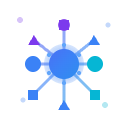"We are drowning in information but starved for knowledge."
For 5,000 years, we've been solving the wrong problem. We mastered storing information—from clay to cloud. But storage was never the bottleneck. The real challenge is threading disparate pieces of knowledge into understanding.
The Past: When Knowledge Had Weight
3200 BC - 1980 AD: The era of physical constraints forced careful curation
𒌷 𒊕 𒈬 𒀭
𒊏 𒈹 𒀀 𒌷
The Library of Alexandria didn't just store scrolls—it created the first systematic attempt at universal knowledge organization. Scholars would travel for months to access its collections, not just for the information, but for the connections between texts that proximity enabled.
The Present: The Paradox of Abundance
1980 - 2025: When infinite storage created infinite fragmentation
We've built a Tower of Babel in reverse. Instead of one tower reaching to heaven, we have thousands of apps reaching nowhere, speaking different languages, refusing to connect. We've optimized for storage while our understanding withers.
The Future: Threading Understanding
2025 and beyond: The age of connected intelligence

FolkLore AI - Connected Intelligence
One intelligent layer unifying all your fragmented knowledge
The future isn't about better apps or smarter algorithms. It's about threading knowledge into wisdom. Imagine:
The Thread That Connects Us All
From Sumerian scribes to Silicon Valley engineers, we've all been trying to solve the same problem: how to extend our minds beyond the limits of memory. We thought the answer was storage. We were wrong.
The answer is connection. Not just links between documents, but threads between thoughts. Not just shared folders, but shared understanding. Not just artificial intelligence, but augmented wisdom.
The future of knowledge isn't about having more—it's about understanding better. It's about systems that think with us, not just for us. It's about threading the vast tapestry of human knowledge into patterns we can finally see, understand, and build upon.
Ready to Thread Your Knowledge?
Join the movement toward calmer, more connected thinking.
Start Threading Today"The next revolution won't be about information. It will be about connection."